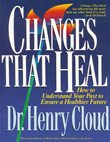On my recent trip to Australia (2010), one of the topics I was asked to address at a conference featuring a redemptive view of homosexuality was “Is Change Possible?” This is a controversial question because there are some loud, insistent voices in the culture who say, “Unless you never again have a homosexual thought or feeling, you haven’t changed. And since no one admits to that, any claim of change is an illusion.”
No one would apply that strict a standard to any other issue! Former alcoholics living sober and free from the chaos of their drinking for decades still would like a cold beer on a hot day, but that doesn’t mean they haven’t changed!
Is change possible? Change is part of life! But transformation is also part of what it means to be a Christ-follower. Understanding how change happens, on the other hand, is another matter. So I have been thinking about the process for a long time as I prepared for my message.
 One of my favorite explanations comes from Dr. Henry Cloud in his book Changes That Heal. He gives a delightful application to one of Jesus’ parables in Luke 13.
One of my favorite explanations comes from Dr. Henry Cloud in his book Changes That Heal. He gives a delightful application to one of Jesus’ parables in Luke 13.
“A man had a fig tree, planted in his vineyard, and he went to look for fruit on it, but did not find any. So he said to the man who took care of the vineyard, ‘For three years I’ve been coming to look for fruit on this fig tree and haven’t found any. Cut it down! Why should it use up the soil?’
“’Sir,’ the man replied, ‘leave it alone for one more year, and I’ll dig around it and fertilize it. If it bears fruit next year, fine! If not, then cut it down.’ (vv. 6-9)
Grace and truth in this parable are symbolized by the actions of “digging around” and “fertilizing.” Using the trowel of God’s truth, we must dig out the weeds and encumbrances of falsehood, sin and hurt that keep the soil of our souls cluttered. In addition, we must add the fertilizer of love and relationship to “enrich the soil.”
As a Bible teacher, a lay counselor, and one involved in helping those deal with unwanted homosexuality, I have seen the truth of Dr. Cloud’s suggestion over and over again. As we study God’s word with an open heart and pursue knowledge of God and intimacy with Him in a personal relationship (“the trowel of God’s truth”), change comes when we identify the lies we have believed about life, about ourselves, about other people, and about God, and replace them with the truth. Change comes when we repent of how our coping mechanisms have become sin because they keep us from trusting God. Change comes when we forgive those who hurt us so we are no longer in bondage to those who left wounds on our souls. Change comes when we live in community, engaging with the Body of Christ who can be “Jesus with skin on” to us. Change comes when people love us and accept us as we are so we can be courageous to deal with our “stuff” and cooperate with God in the changing, healing process.
Dr. Cloud continues,
But the Bible tells us that in order for grace and truth to produce fruit, we need a third key element: time.
Look again at verses 8 and 9. “’Sir,’ the man replied, ‘leave it alone for one more year, and I’ll dig around it and fertilize it. If it bears fruit next year, Fine! If not, then cut it down.’” The gardener, who certainly symbolizes our Lord, the “author and perfecter” of our faith, realized that his work and the fertilizer need time to take effect. In short, it takes time to grow. And time alone will not do it. Time must be joined by grace and truth. When we respond responsibly to these three elements, we will not only heal, but also bear fruit.
We live in a microwave culture that has trained us to have unrealistic expectations about time. We want instant everything, and we hate waiting. I received an email from a young man in his early 20s who hated his same-sex attractions and wondered how long it would take to get rid of them. I explained to him that it’s not like a bad case of acne, it’s far more complex than that, and that it’s our experience that for people his age, three to five years of actively “digging around” in the soil of their hearts and minds produces lasting change. He thought that was too long. I wondered, “What will your life look like in three to five years if you keep going down the path you’re on? Bless your heart!”
Change is normative. Change is expected. Change is hard work, but we have the assistance of our divine Gardener to make it happen.
This blog post originally appeared at
blogs.bible.org/how-change-happens/
on Sept. 14, 2010